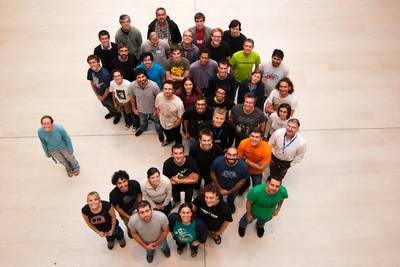Advanced Scientific Programming in Python
an Autumn School by the G-Node, the Center for Mind/Brain Sciences and the Fondazione Bruno Kessler
Scientists spend more and more time writing, maintaining, and debugging software. While techniques for doing this efficiently have evolved, only few scientists actually use them. As a result, instead of doing their research, they spend far too much time writing deficient code and reinventing the wheel. In this course we will present a selection of advanced programming techniques with theoretical lectures and practical exercises tailored to the needs of a programming scientist. New skills will be tested in a real programming project: we will team up to develop an entertaining scientific computer game.
We'll use the Python programming language for the entire course. Python works as a simple programming language for beginners, but more importantly, it also works great in scientific simulations and data analysis. Clean language design and easy extensibility are driving Python to become a standard tool for scientific computing. Some of the most useful open source libraries for scientific computing and visualization will be presented.
This school is targeted at Post-docs and PhD students from all areas of science. Competence in Python or in another language such as Java, C/C++, MATLAB, or Mathematica is absolutely required. A basic knowledge of the Python language is assumed. Participants without prior experience with Python should work through the proposed introductory materials.
Download the original announcement: pdf
Date & Location
October 4th — 8th, 2010. Trento, Italy.
The school will take place at the Fondazione Bruno Kessler.
Application
Application deadline is expired.
No fee is charged but participants should take care of travel, living, and accommodation expenses.
Prerequisites
You are supposed to know the basics of Python to participate in the lectures!
If you are not familiar with Python, you are urged to go through the excellent Python Scientific lecture notes edited by Emmanuelle Gouillart and Gaël Varoquaux. Here is a printer friendly version.
Program
Lectures start at 8:30 and finish around 18:30 everyday. During the day we will have coffee&tea short breaks and a long lunch break. Every evening we will have the tutors' consultation hour: Tutors will answer your questions and give suggestions for your own projects.
On Monday October 4 registration starts at 8:30: please try to be there as soon as possible, the lecture starts at 8:30 sharp.
Friday evening we will have a party, so don't leave before Saturday ![]()
- Day0 (Mon Oct 4): Advanced Python & Software Carpentry
- Day1 (Tue Oct 5): Software Carpentry
- Day2 (Wed Oct 6): Scientific Tools for Python
- Day3 (Thu Oct 7): The Quest for Speed
- Day4 (Fri Oct 8): Practical Software Development
Detailed schedule and materials
All materials in a zip file!
The PacMan project
Students
All students are of course invited to join our Facebook group: Kung-fu Python
Faculty
Francesc Alted, author of PyTables, Castelló de la Plana,  Spain
Spain
Pietro Berkes, Volen Center for Complex Systems, Brandeis University,  USA
USA
Valentin Haenel, Berlin Institute of Technology and Bernstein Center for Computational Neuroscience Berlin,  Germany
Germany
Zbigniew Jędrzejewski-Szmek, Faculty of Physics, University of Warsaw,  Poland
Poland
Eilif Muller, The Blue Brain Project, Ecole Polytechnique Fédérale de Lausanne,  Switzerland
Switzerland
Emanuele Olivetti, NeuroInformatics Laboratory, Fondazione Bruno Kessler and University of Trento,  Italy
Italy
Rike-Benjamin Schuppner, Bernstein Center for Computational Neuroscience Berlin,  Germany
Germany
Bartosz Teleńczuk, Institute for Theoretical Biology, Humboldt-Universität zu Berlin,  Germany
Germany
Bastian Venthur, Berlin Institute of Technology and Bernstein Focus: Neurotechnology,  Germany
Germany
Stéfan van der Walt, Applied Mathematics, University of Stellenbosch,  South Africa
South Africa
Tiziano Zito, Berlin Institute of Technology and Bernstein Center for Computational Neuroscience Berlin,  Germany
Germany
Organized by Paolo Avesani for the Center for Mind/Brain Sciences and the Fondazione Bruno Kessler  , and by Zbigniew Jędrzejewski-Szmek and Tiziano Zito for the German Neuroinformatics Node of the INCF
, and by Zbigniew Jędrzejewski-Szmek and Tiziano Zito for the German Neuroinformatics Node of the INCF  .
.
Evaluation survey
Previous Editions
Summer school in Berlin, Germany, August 31st — September 4th, 2009.
Winter school in Warsaw, Poland, February 8th — 12th, 2010.
You may be interested in the results of our evalutation surveys:
Results for the summer school in Berlin
Results for the winter school in Warsaw
Contact
For any further questions, please write to python-info@g-node.org.
The faculty list is visible above. The list of participants is on a separate page.

